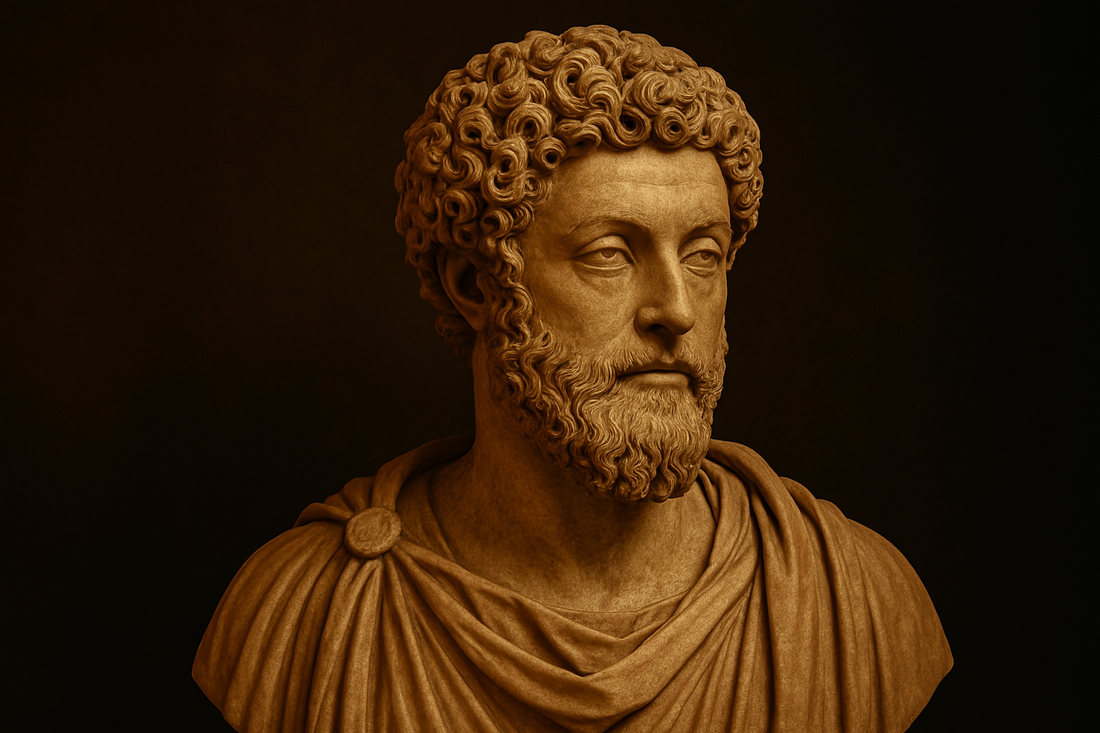
Marcus Aurelius – The Philosopher King
Marcus Aurelius – The Philosopher King of Ancient Rome
Marcus Aurelius – The Philosopher King – is one of history’s most powerful examples of wisdom in leadership. As the Roman Emperor from 161 to 180 CE, he ruled with reason, humility, and a deep commitment to Stoic principles.
His personal reflections, now known as Meditations, remain a guiding light for millions seeking strength, clarity, and virtue in everyday life.
👉 New to Stoicism? Begin your journey with the What Is Stoicism? » to understand the philosophy that shaped Marcus Aurelius’s mind and rule.
Who Was Marcus Aurelius?
Marcus Aurelius was born in 121 CE in Rome and adopted into the ruling family. Though destined for power, he lived as a humble student of philosophy—particularly Stoicism.
He studied under the guidance of Epictetus’s teachings and believed that true strength came not from wealth or status, but from self-discipline, justice, and wisdom.
📌 Learn more about the thinkers who inspired Marcus on our Stoic Philosophers Page » and explore the legacy of Stoicism’s greatest minds.

Meditations – A Stoic Masterpiece Written in Solitude
Marcus’s most famous work, Meditations, was never meant to be published. These were private journal entries—written at night, in camps, or between battles. They reveal a man deeply committed to philosophical introspection, even while ruling an empire.
Inside Meditations, Marcus Aurelius reflects on:
- The shortness of life
- The importance of virtue
- The value of self-restraint and emotional control
- The practice of gratitude, perspective, and reason
📌 Want to read his most powerful reflections? Explore Meditations by Marcus Aurelius »
📘 See other essential Stoic books on our Stoic Books Collection Page »
Marcus Aurelius and Stoic Leadership
What made Marcus Aurelius – The Philosopher King so rare was his ability to lead with virtue, even in the face of war, loss, plague, and betrayal.
Unlike other rulers, Marcus believed that the role of a leader was to serve, not to dominate. His daily Stoic practice included:
- Journaling and Reflection
- Resisting anger and envy
- Focusing on justice, courage, and reason
- Accepting death, fate, and impermanence
📌 Want to embody his mindset? Read our guide: How to Practice Stoicism Daily » and lead yourself with the same clarity and discipline.

Lessons from Marcus Aurelius for Modern Life
Though he lived 2,000 years ago, Marcus Aurelius continues to impact:
✅ Entrepreneurs and CEOs – seeking calm and clarity
✅ Athletes and creatives – building mental strength
✅ Leaders and students – navigating stress and adversity
His philosophy teaches us to:
- Control what we can, and let go of what we cannot
- Respond with virtue, not emotion
- Focus on the present, and prepare for the future
- Embrace Memento Mori – the reminder that death gives life meaning
📌 Curious how Stoicism still applies? Discover the principles he lived by in Core Principles of Stoicism »
📜 Or explore his influence on Modern Stoicism » and how it's practiced today.
Quotes from Marcus Aurelius – Wisdom in Every Line
Here are just a few lines from Meditations that reveal the heart of this philosopher king:
“You have power over your mind—not outside events. Realize this, and you will find strength.”
“The happiness of your life depends upon the quality of your thoughts.”
“Waste no more time arguing what a good man should be. Be one.”
📌 Explore more in our curated Marcus Aurelius Quotes » for daily inspiration.

Final Thoughts – Why Marcus Aurelius Still Matters
Marcus Aurelius wasn’t perfect—but he was honest, disciplined, and deeply human. He showed the world that power without philosophy is empty, and that true greatness comes from living with purpose.
Whether you're leading others or just trying to master your mind, the teachings of Marcus Aurelius – The Philosopher King offer the strength, wisdom, and perspective we need today.
🏛️ Continue exploring Stoic wisdom on our Homepage » and access tools, teachings, and products to help you embody this timeless philosophy.
📚 Dive deeper into all the great Stoics on our Stoic Philosophers » and see how they still shape the modern mind.